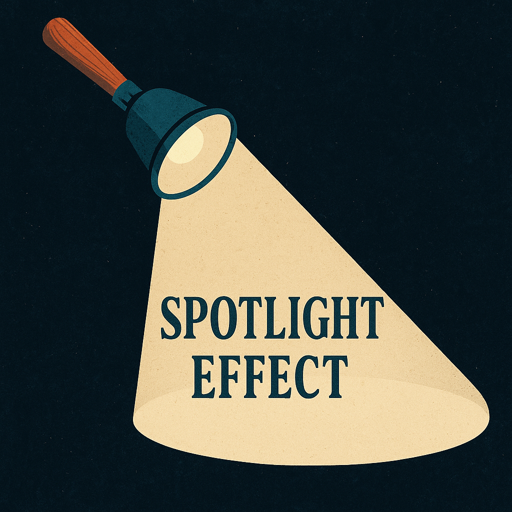Spotlight Effect

Does everyone see your thoughts? Not everyone can see your thoughts.
Could it be that you are the one seeing them too much? I’m talking about the famous Spotlight Effect.
Do we even know what it means to perceive without the interference of concepts and words?
Little by little, we are turning into passive automatons, merely watching our own thoughts.
It feels as if a stage light is fixed above us, and with an obsessive self-awareness we look around, constantly searching for ourselves.
But in doing so, we clothe everything we see (or think we see!) with our obsessive thoughts.
Everything around us is besieged by the swirl of our own mind.
A person begins to feel as though their thoughts are displayed behind a glass window, open for everyone to see.
They imagine that everyone is watching their thoughts.
Life becomes strained for someone who is overly self‑focused, constantly watching and monitoring themselves.
As I mentioned in my previous piece, this self‑obsession—being endlessly fixated on oneself and on the flow of one’s own thoughts—must be exhausting…

Today we know that behind every success and every step forward, there are countless failed attempts, countless collisions with the wall.
Think of the mid‑20th century, when humanity, fresh from a global crisis, began to take experimental steps. The dark history of psychiatry is marked by painful experiments:
From lobotomies to improvised emergency solutions under wartime conditions, all of which found their place on the shelves of “Humanity’s margin of error.”
The crisis during the pandemic reminded us of this again:
the rush of early vaccine trials and the thousands of people exposed to their side effects.
Did it have to happen?
Yes, it did…
Spotlight Effect: Branded and Packaged Psychology
Psychology’s attempt to bridge all the gaps civilization has created in the modern individual only creates more gaps. This is the result of the self-obsessed individual and his delusions and distortions.
Indeed, there are a few sociologists and scientists who have best analyzed this to date: Zygmunt Bauman, Byung Chul-Han, and several leading American neuroscientists and psychiatrists, including Donald Hoffman, Andrew Huberman, and Cal Newport.
Psychology has become a safety valve for the overly conscious individual disconnected from nature. In today’s rapidly changing world, explanations, analyses, over-analyses, and metacognition endlessly preoccupy us. Yet, these solutions offer palliative, temporary solutions.
The most important reason for the Spotlight Effect, as Zygmunt Bauman put it, is that the modern, fluid world forces individuals to seek autobiographical solutions to systemic problems. Every minute of every day, we see instructions all around us that confine individuals to themselves.

At work, on the street, among family and friends. Individuals are now constantly turning inward and becoming overly preoccupied with themselves. Of course, there are certain key factors at play here, such as the amateurish use of psychology in society, the constant reshuffling of words and concepts in the public discourse, their adaptation to different situations and circumstances, and the same argument and word being applied to everyone in the same way.
We place ourselves too much at the center. In an age of speed, we experience an information explosion where everything flows simultaneously and coexists. As a result, individuals must dismantle themselves to keep up. We are facing a system that is collapsing from within. We go to bed with the system’s perpetual “flux” mechanism.
Spotlight Effect: The Weight Of Thoughts
When we look at an object, the object has already looked at us. Indeed, in Zizek’s philosophy, the relationship between us, the subjects, and inanimate objects, the objects, is the mathematical embodiment of psychodynamic analysis in Zizek’s terms. But can we consider this for the real people we are facing?
If, when we look at someone, they have already looked at us, is there a definitive truth that they are thinking about us? If we accept their existence, what and how much can we know about what they are thinking?

Renowned British theorist Terry Eagleton‘s analysis in his book Culture is quite famous. Overvaluing one’s own emotions creates the centrifugal force of emotionality. This process of care, in turn, leads one to a kind of unconscious selfishness. Eagleton essentially describes an individual who is spinning out of control with a self-absorbed introspection. Being overly preoccupied with one’s own emotions and thoughts unknowingly sacrifices the individual to the destructive violence of their own mind.
(**The nature of communication is essentially like abstract mathematics. Speaking, listening, responding, following the conversation, unconscious leaks, external interruptions, and then drifting away from the topic and moving on to another. When we look at the overall picture, we see the rhythm of numbers flowing within a unit. It’s like a constantly working machine recording sequences. Rhythm, intonation, pauses, and so much more. There’s a very comprehensive mechanism operating behind the scenes in the hidden adventure of communication. And I believe this mechanism has its mathematics.**)


